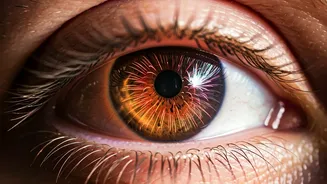Fireworks & Lenses
Diwali festivities are synonymous with the vibrant display of fireworks, which often illuminate the night sky. While these spectacles bring joy, many overlook
the potential dangers, particularly when wearing contact lenses. Exposure to heat, smoke, and debris from fireworks poses a significant risk to eye health. Contact lenses can trap these substances close to the eye, exacerbating the potential for irritation and more severe issues. Understanding the risks is the first step towards a safe Diwali celebration for your vision.
Contact Lens Hazards
The close proximity to fireworks introduces several hazards for contact lens wearers. Contact lenses, sitting directly on the cornea, can easily accumulate dust, smoke particles, and chemical residues released by fireworks. These substances can cause irritation, redness, and allergic reactions, potentially leading to conjunctivitis or corneal abrasions. Additionally, heat and sparks from fireworks can dry out contact lenses, increasing the risk of tiny scratches on the cornea. In extreme situations, chemical fumes may react with the lens, resulting in infections if not promptly addressed. Recognizing these dangers helps prioritize eye safety during Diwali.
Safer Alternatives
When celebrating Diwali, prescription glasses present a much safer alternative to contact lenses. Glasses serve as a protective barrier, shielding the eyes from heat, dust, and other contaminants. This simple change significantly reduces the likelihood of eye irritation or injury. By making this choice, individuals can enjoy the festivities without compromising their vision health. It is a proactive step towards ensuring a safer and more enjoyable Diwali celebration.
Immediate Actions
If irritation, redness, or blurred vision occurs while wearing contact lenses during Diwali, prompt action is essential. Remove the lenses immediately. Gently cleanse the eyes with clean water, making sure to avoid rubbing or touching them. Should symptoms persist or worsen, seek immediate medical evaluation from an ophthalmologist. Early intervention can prevent further damage and ensure the eye receives the appropriate care. Prioritizing these steps will help to preserve your vision and protect your eye health.













